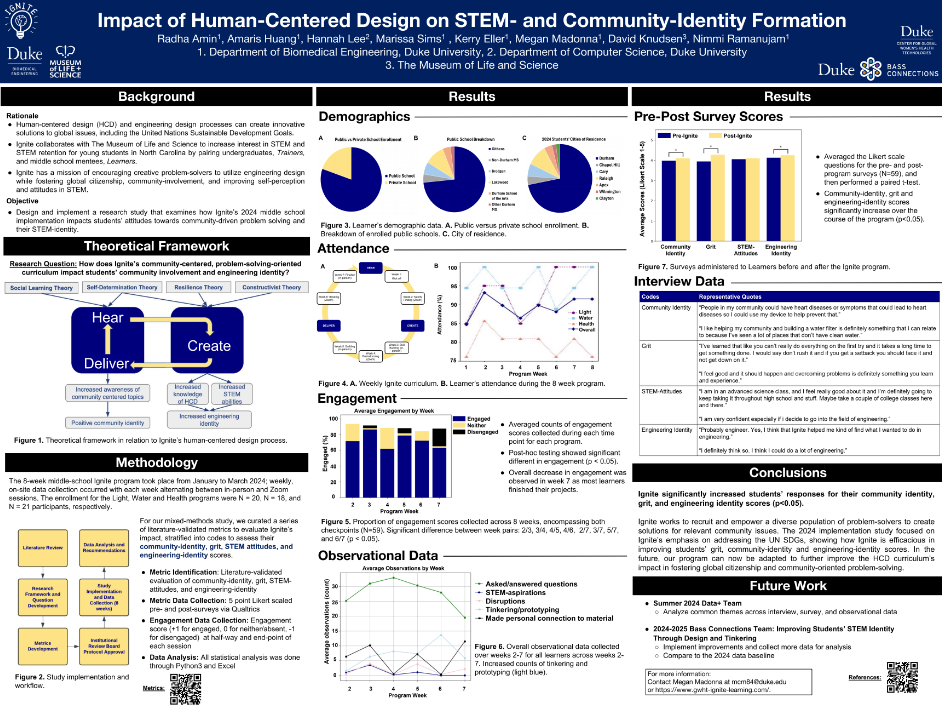Creating Community Alongside Engineering Identity
Project Team
Team profile by Kerry Eller, Amaris Huang, Radha Amin, Hannah Lee, Marissa Sims, Megan Madonna, David Knudsen and Nimmi Ramanujam
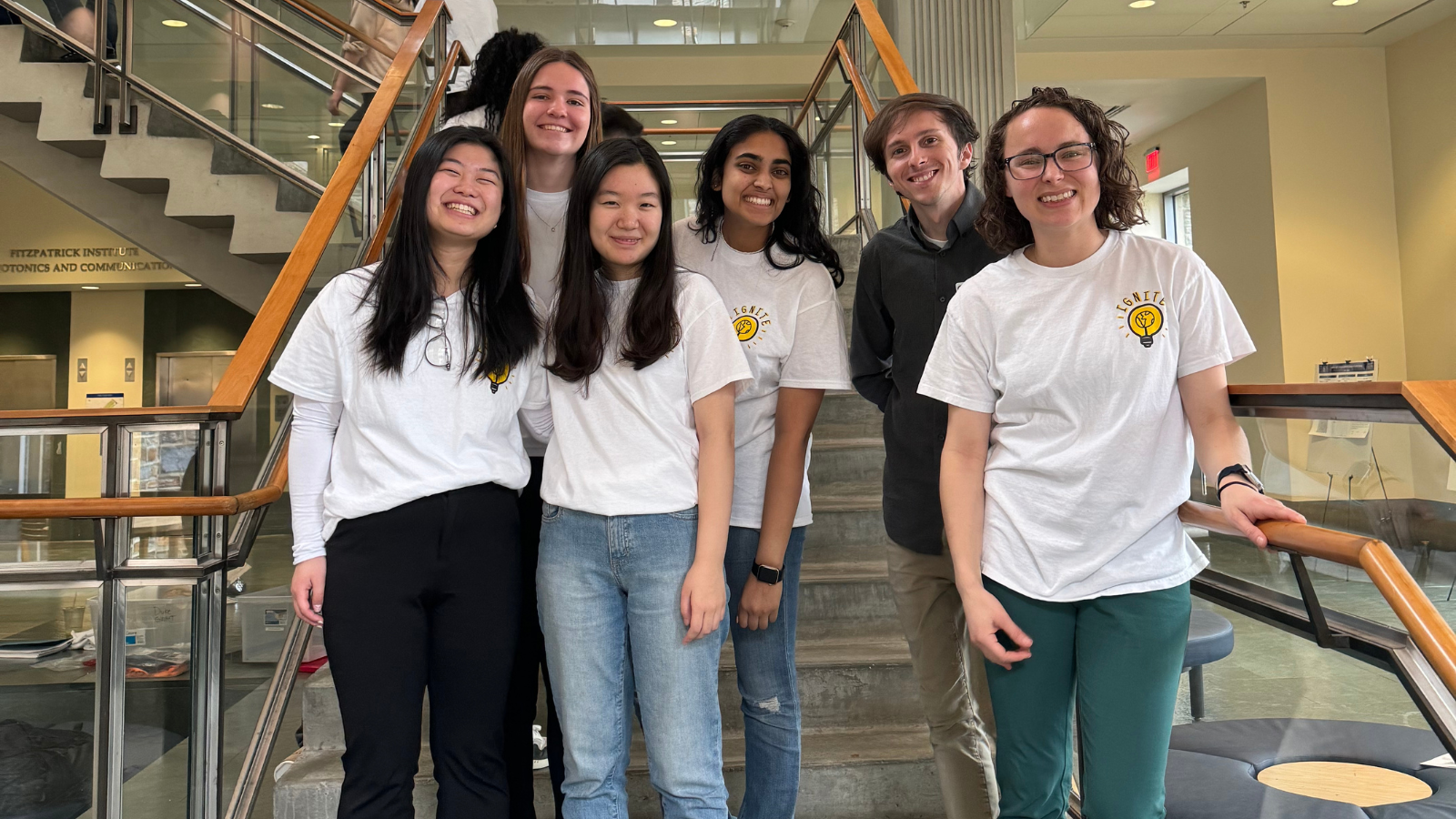
Ignite is a program that integrates human-centered design (HCD), co-learning and the United Nations Sustainable Development Goals (SDGs) to promote collaborative mentorship and foster global awareness in the fields of science, technology, engineering and math (STEM). Ignite collaborates with the Museum of Life and Science in Durham, North Carolina, to introduce tinkering and design experiences to local middle and high school students.
Student participants work on solutions related to three different problem spaces surrounding specific SDGs. For our middle school program, Ignite pairs undergraduate students – Trainers – and middle school mentees – Learners – in predetermined modules to teach them about tinkering and problem-solving for community issues salient to them. Our high school program challenges high school mentees – Makers – to choose a problem in their community they are passionate about and Trainers serve as mentors throughout the design process.
This year, our team focused on education research surrounding our middle school program. Within this program, Learners worked on a design project anchored in the Light, Water or Health SDGs for eight weeks. On the program’s final day, the students presented their posters and projects in a final showcase called “Duke Day” for students, family members and the Duke and Durham community.

Our research study centered on evaluating the 2024 implementation of Ignite, focusing on improving student science identity and community problem-solving through the program. The central research question was, “How does the community-centered, problem-solving-oriented curriculum impact students’ community involvement and engineering identity within their community?”
In the fall, our team worked to develop a research framework for engineering education to guide future Ignite implementations in Durham and contribute insights to the broader engineering education field (Figure 1).
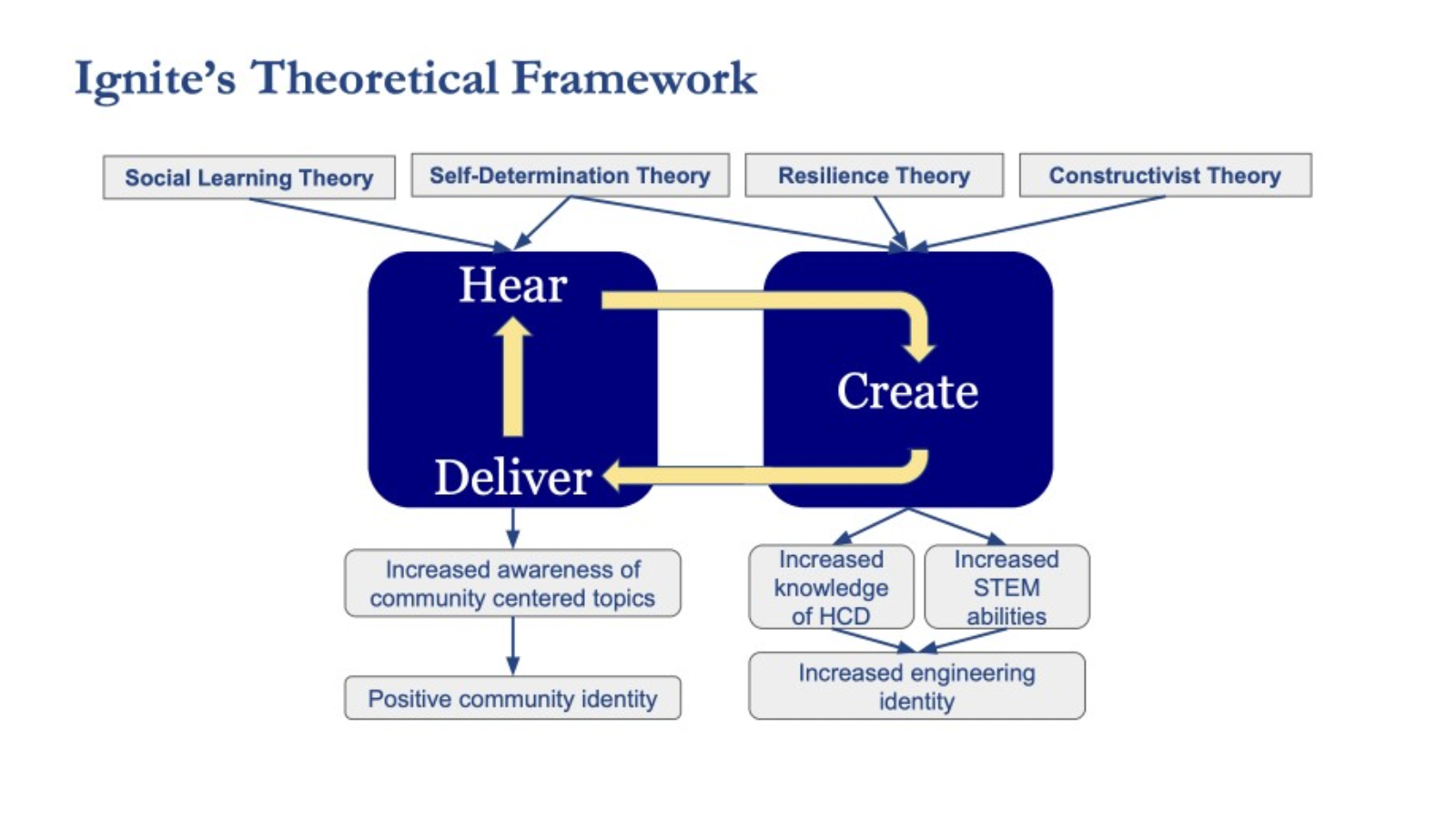
We executed our research study in the spring semester during Ignite’s Spring 2024 Learners program, which included 70 local middle school students from Durham and the surrounding area. We collected data using our designed research framework and metrics to evaluate the program’s outcomes. This data will be used as a baseline for future programs, which will be modified based on our results to improve the program and evaluated using the research framework we created.
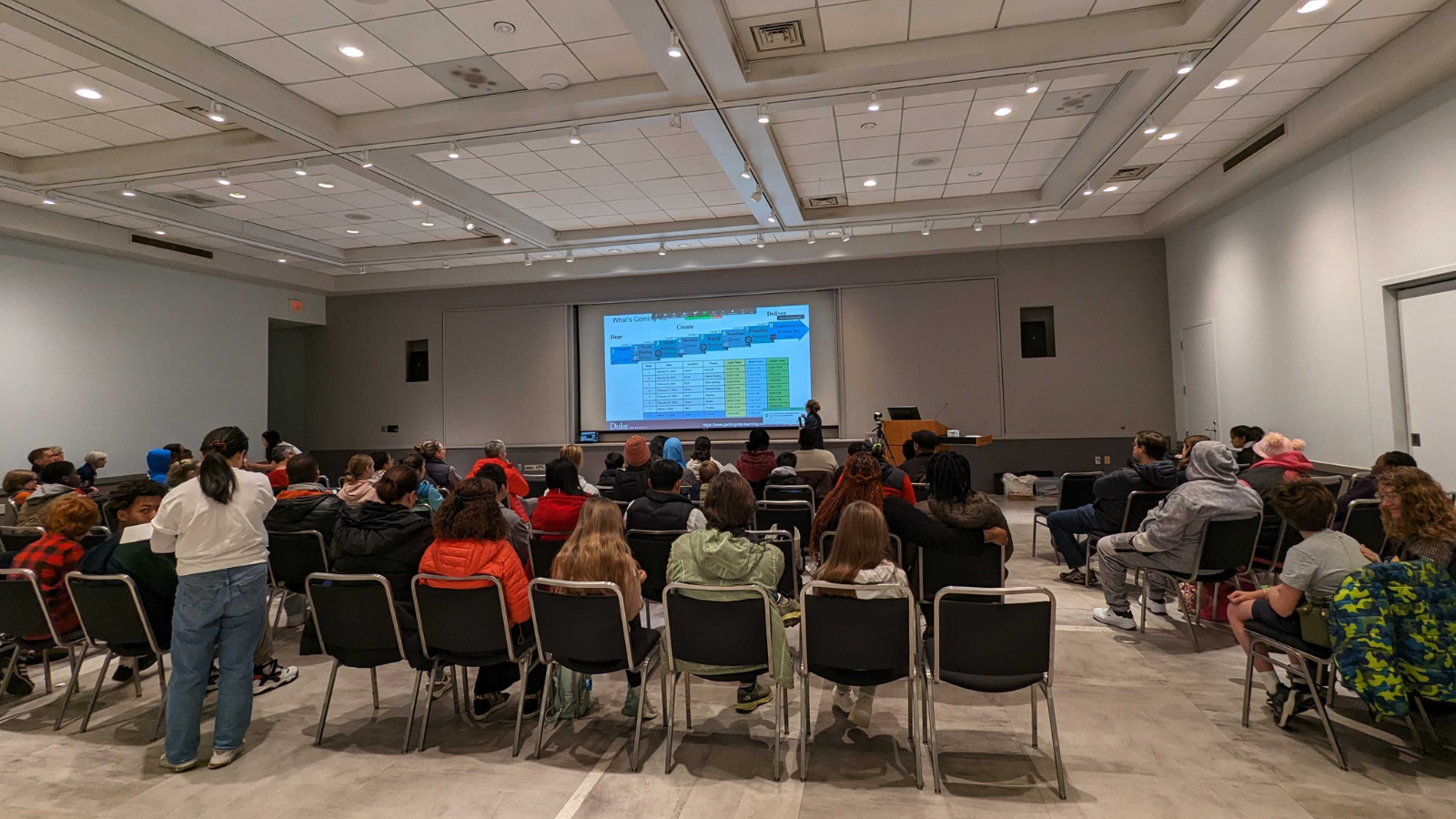
To inform the research question, our team observed Ignite’s middle school sessions to track students’ engagement and participation throughout the program. We administered pre- and post-program surveys to identify changes in the students’ learning, community identity, grit, STEM attitudes and engineering identity scores. We also conducted post-program interviews to collect qualitative information on students’ experiences in the program.

Our research team was headed by Kerry Eller, Megan Madonna, David Knudsen and Nimmi Ramanujam. The team of Bass Connections students included Radha Amin, Amaris Huang, Hannah Lee, and Marissa Sims. We extend special thanks to team advisors, Nimmi Ramanujam, Megan Madonna and David Knudsen for their continued leadership and support.
We also would like to thank Amy Anderson, Bridgette Hard, Ann Saterbak, Kathy Eller and Scott Holcomb for their valuable guest lectures and guidance, which significantly contributed to our knowledge surrounding engineering education and the implementation of our research study.
Additionally, we would like to thank our faculty guest lecturers, Hyewon Grigoni of Duke Campus Institutional Review Board (IRB), Emily Hazlett of Duke’s Office of Research and Innovation, Brie Sanders and Alyssa Florwick of the Duke Office of Durham and Community Affairs, and Aaron Kyle of Biomedical Engineering for sharing their work and insights within the field of educational outreach research.
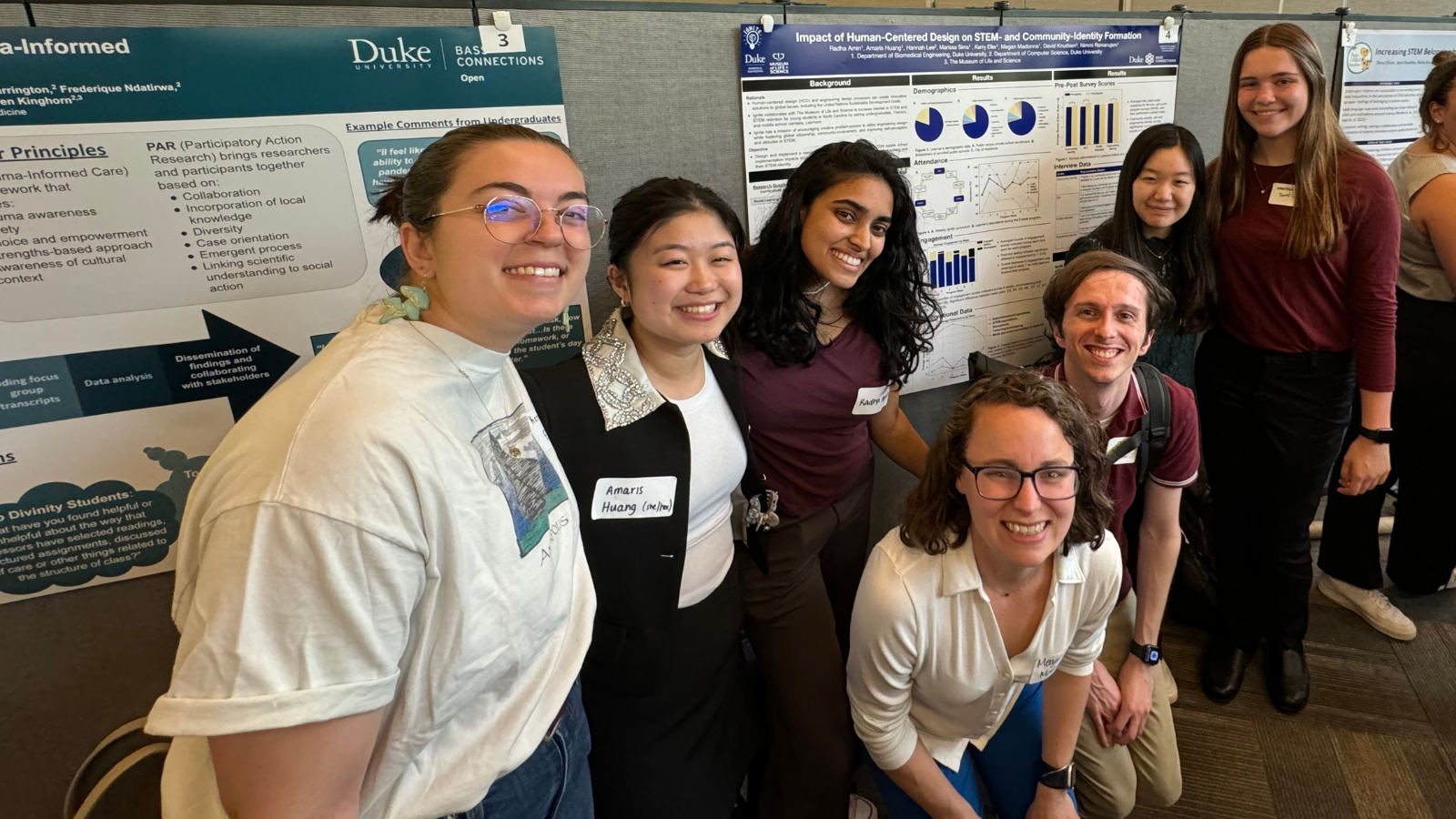
For our mixed-methods study, we curated a series of literature-validated metrics to evaluate Ignite’s impact and stratified them into codes to assess students’ community identity, grit, STEM attitudes and engineering identity scores. We conducted pre- and post-program surveys using Likert scale questions and employed a paired t-test, revealing a significant increase in community identity, grit, and engineering identity scores throughout the program (Figure 2).

Additionally, we tracked engagement data halfway through and at the end of each weekly session, assigning scores based on students’ level of engagement: +1 if they were engaged, 0 if they were neither or absent, and -1 if they were disengaged. Post-hoc analysis revealed significant differences between various pairs of weeks.
Furthermore, we gathered observational data throughout the program, documenting student behaviors such as asking questions, note-taking, forming community and personal connections, engaging with peers, following instructions, prototyping and verbalizing hypotheses.
Finally, on the last day of the program, we conducted a series of student interviews to gain qualitative data on student’s attitudes on the program and engineering, surrounding core themes of community identity, grit, STEM attitudes and engineering attitudes. We will conduct thematic analysis and NVivo coding of interview data.
Ignite’s mission is to empower a diverse population of problem-solvers to create solutions for relevant community issues. Our research study is focused on Ignite’s emphasis is equipping students with the skills to address ubiquitous global issues that may also be localized to their community and lives.
Our study shows that Ignite is efficacious in improving students’ grit, community-identity and engineering-identity scores. This year’s study serves as the foundation for future Ignite studies and will be built upon in coming years to both improve and evaluate our program. In the future, our program can now be adapted to further improve the HCD curriculum’s impact in fostering global citizenship and community-oriented problem-solving.
Impact of Human-Centered Design on STEM- and Community-Identity Formation
Poster by Radha Amin, Amaris Huang, Hannah Lee, Marissa Sims, Kerry Eller, Megan Madonna, David Knudsen and Nimmi Ramanujam

